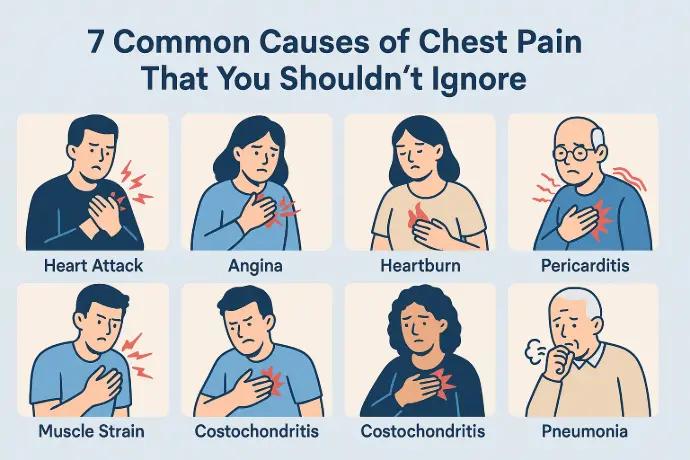
Chest pain is one of the most alarming symptoms anyone can experience. While many people immediately think of a heart attack, chest pain can actually be caused by many different health issues some serious, some not. Knowing the common causes of chest pain can help you understand what might be going on and when you should see a doctor.
In this article, we’ll explain 7 common causes of chest pain in simple words, so you can stay informed and take care of your health.
1. Heart Attack
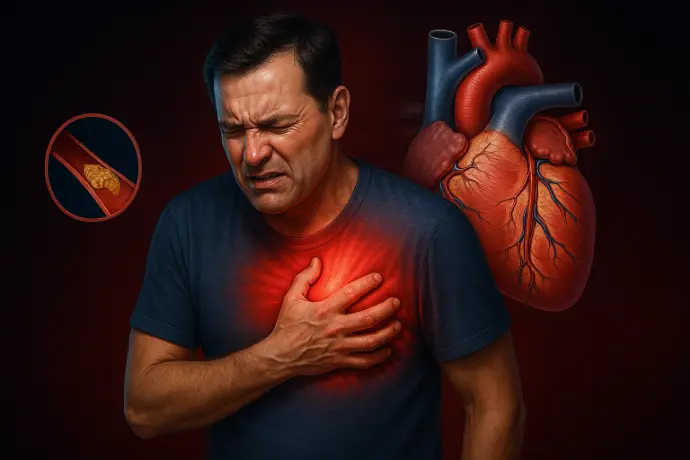
A heart attack happens when blood flow to a part of the heart is blocked. This can damage the heart muscle and is a medical emergency.
What it feels like:
● Pressure, tightness, or squeezing in the chest
● Pain that spreads to the arms, neck, jaw, or back
● Shortness of breath
● Cold sweat, nausea, or lightheadedness
Important: If you or someone else has these symptoms, call emergency services immediately.
2. Angina
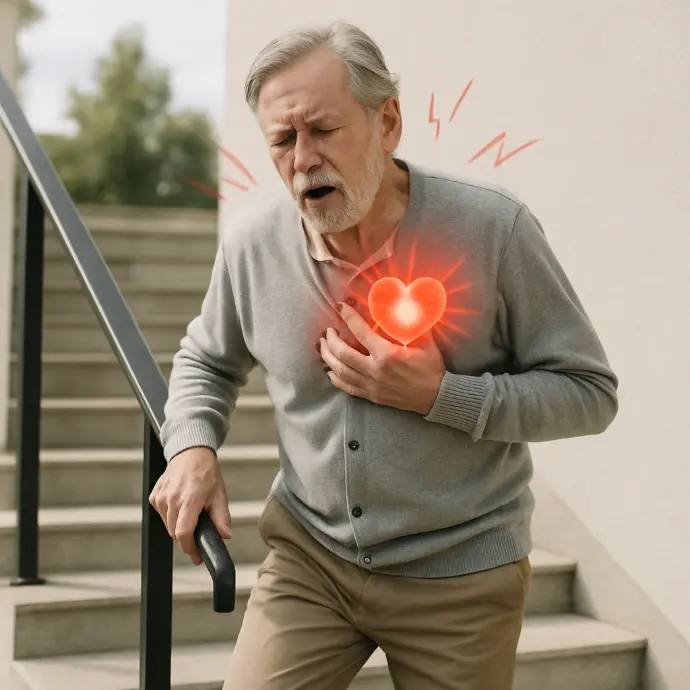
Angina is chest pain caused by reduced blood flow to the heart. Unlike a heart attack, angina doesn't usually cause permanent damage to the heart. However, it's still a sign that something is wrong.
What it feels like:
● A feeling of pressure or tightness in the chest
● Often triggered by physical activity or stress
● Usually goes away with rest or medication
Angina is a warning sign of heart disease and should not be ignored. If you often get chest pain during exercise or stress, talk to your doctor.
3. Acid Reflux or Heartburn
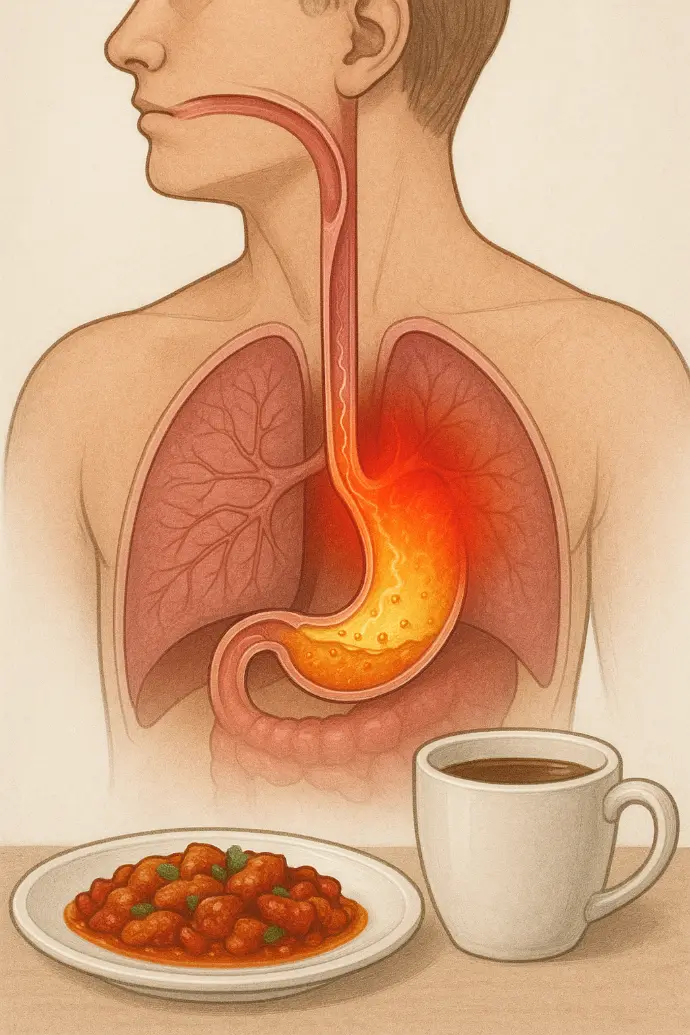
Not all chest pain comes from the heart. Sometimes, it's the stomach. Acid reflux happens when stomach acid flows back into the food pipe (esophagus), causing a burning feeling.
What it feels like:
● A burning pain in the chest, especially after eating
● Pain that worsens when lying down
● A sour or bitter taste in the mouth
This type of pain is usually not serious but can be uncomfortable. Lifestyle changes and antacids can help relieve the symptoms.
4. Muscle or Rib Strain
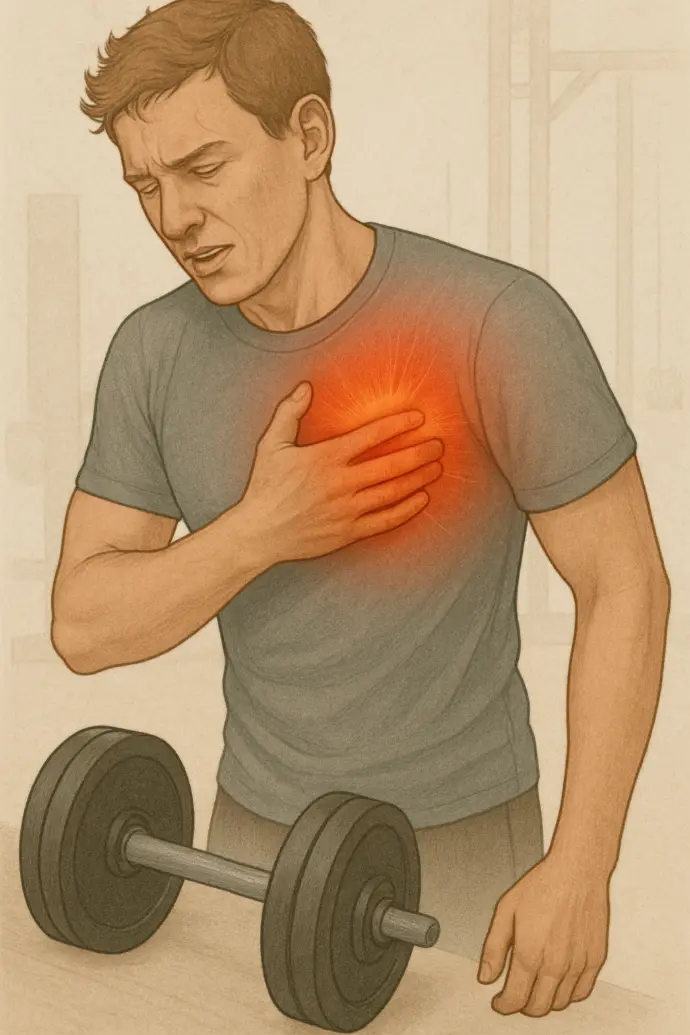
Chest pain can also come from the muscles and bones in the chest. If you’ve lifted something heavy, worked out hard, or had a recent fall, you may have strained a muscle or bruised a rib.
What it feels like:
● Sharp or sore pain in a specific spot
● Pain that gets worse when you move, stretch, or press the area
● May feel better with rest and over-the-counter pain relief
Muscle-related chest pain usually goes away on its own, but if it doesn’t improve or gets worse, check with a doctor.
5. Panic Attacks
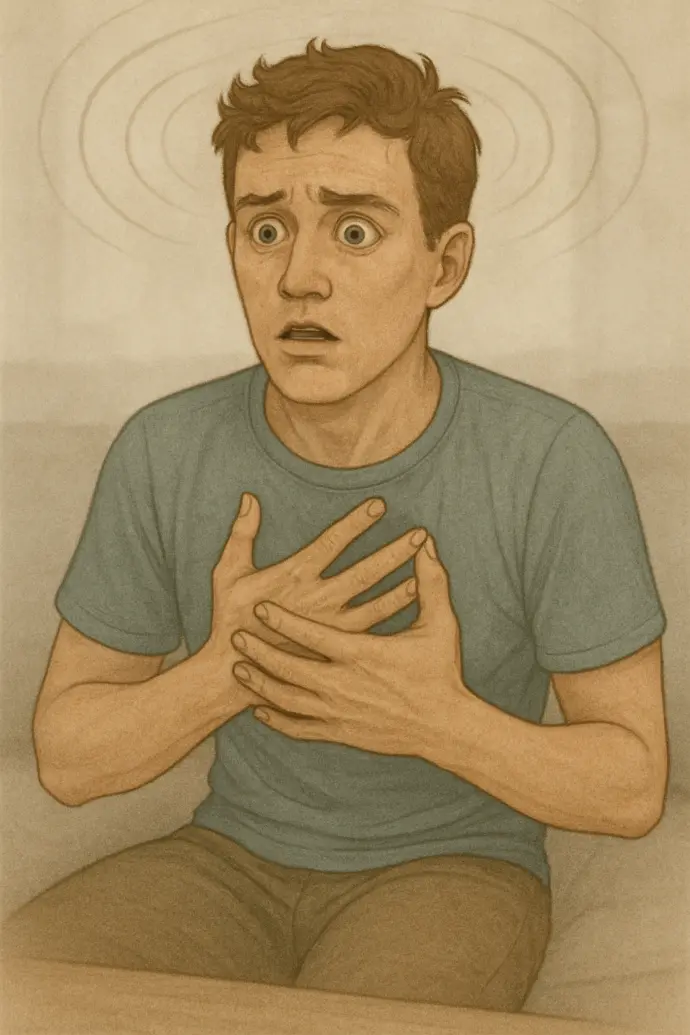
Sometimes, chest pain isn’t caused by a physical problem but by extreme stress or anxiety. Panic attacks can cause real, scary symptoms that feel just like a heart attack.
What it feels like:
● Sudden, intense chest pain or tightness
● Fast heartbeat
● Trouble breathing
● Feeling dizzy, shaky, or like you’re going to pass out
● A strong sense of fear
While panic attacks aren't dangerous, they can feel overwhelming. If you have frequent panic attacks, mental health support can help you manage them.
6. Lung Problems (like Pneumonia or Pleurisy)
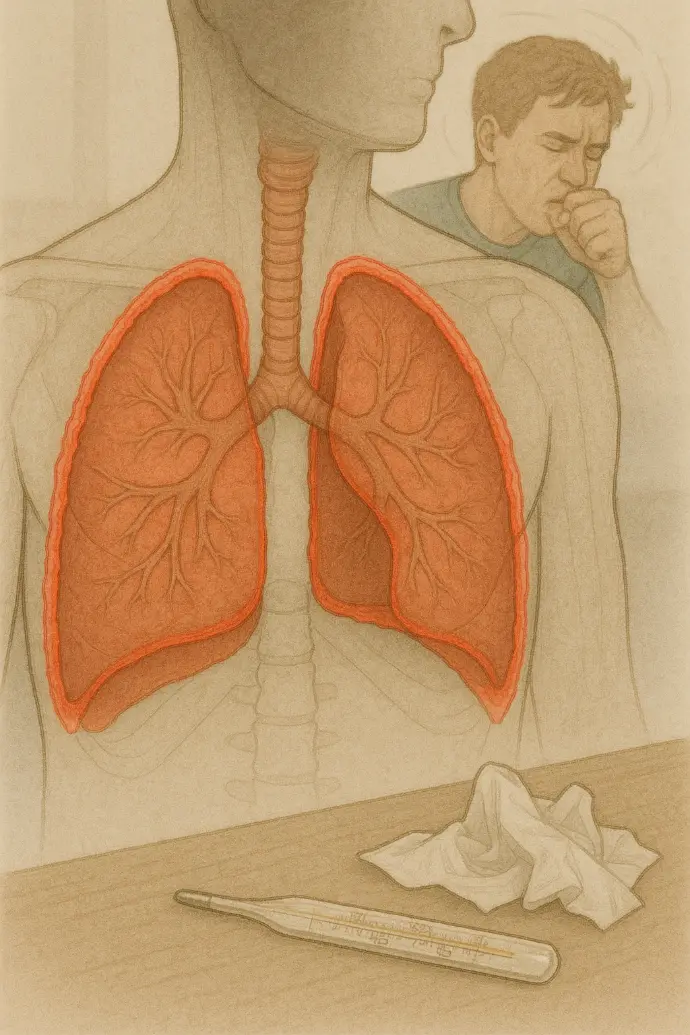
Lung infections or inflammation can also cause chest pain. When the lining around your lungs (pleura) becomes inflamed, it can hurt every time you breathe.
What it feels like:
● Sharp pain that gets worse when you breathe, cough, or sneeze
● Fever, cough, and shortness of breath (if it’s an infection)
● Tiredness or chills
Lung-related chest pain should be taken seriously. If you have these symptoms, see a doctor for proper diagnosis and treatment.
7. Blood Clot in the Lungs (Pulmonary Embolism)
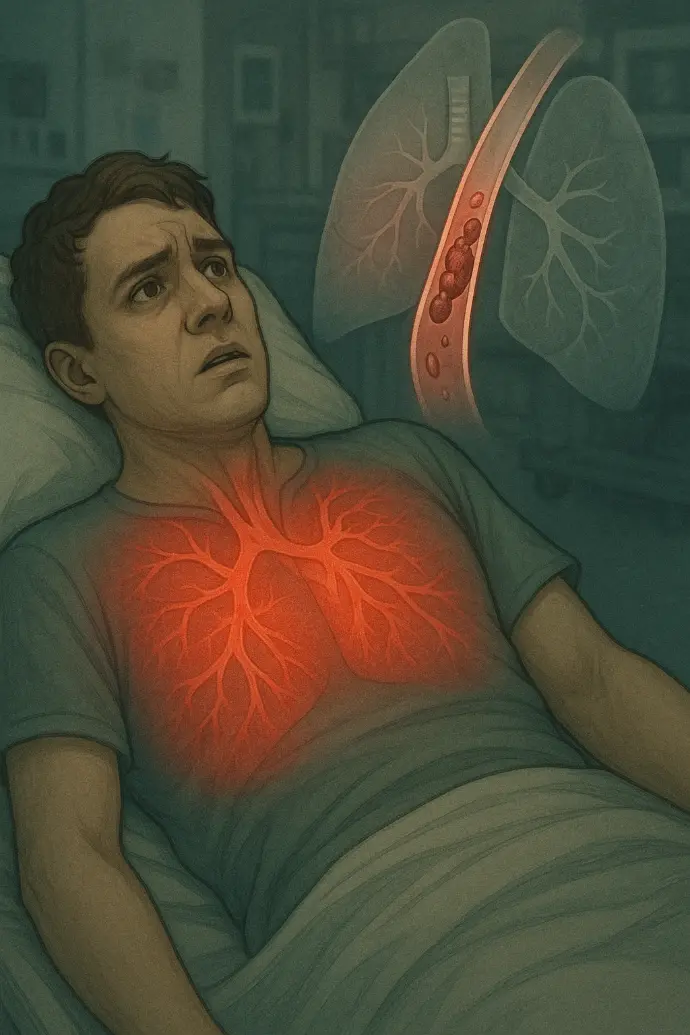
This is a serious condition that happens when a blood clot travels to the lungs and blocks a blood vessel. It’s a medical emergency.
What it feels like:
● Sudden, sharp chest pain
● Shortness of breath
● Fast heartbeat
● Coughing (sometimes with blood)
● Feeling faint or anxious
Pulmonary embolism needs quick treatment. If you suspect this, go to the hospital immediately.
When Should You Worry?
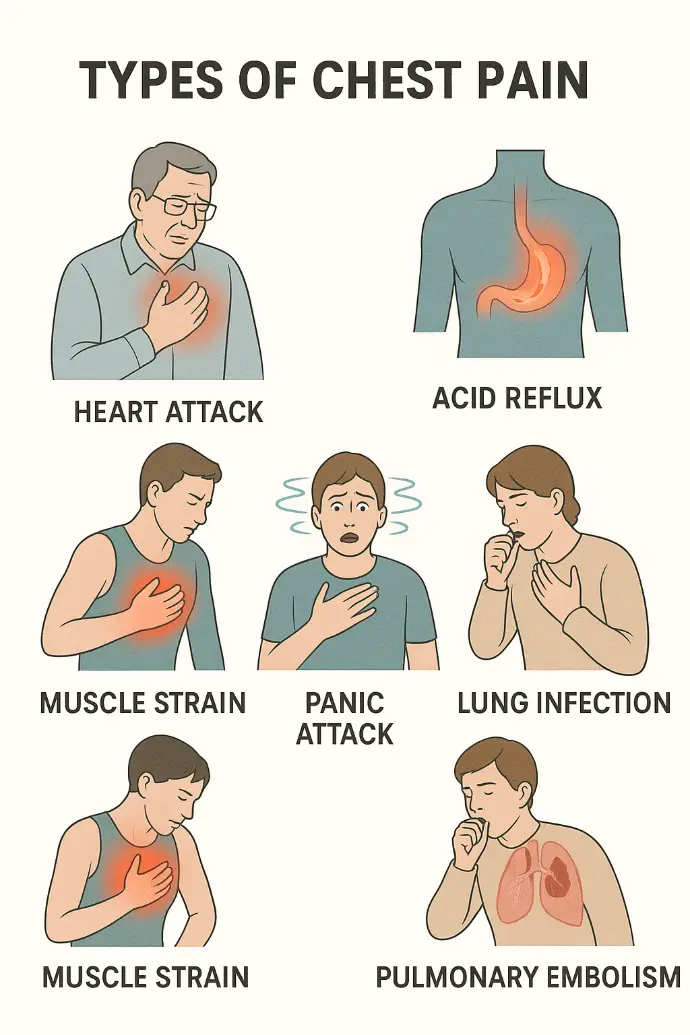
● Always get medical help if your chest pain:
● Feels like pressure, squeezing, or heaviness
● Spreads to your arm, neck, or back
● Comes with shortness of breath, sweating, or nausea
● Doesn’t go away or keeps coming back
● Happens while you’re resting
It’s better to be safe and get checked by a doctor, even if the cause turns out to be something mild.
Final Thoughts
Chest pain can be caused by many different things from a pulled muscle to a heart attack. Some causes are harmless, but others can be life-threatening. That’s why it’s important to listen to your body and seek help when something feels wrong.
Remember: Chest pain should never be ignored.
Knowing the common causes and symptoms can help you take the right steps to protect your health or help someone else in need.
Stay informed. Stay healthy. And always trust your instincts.
Thank You...